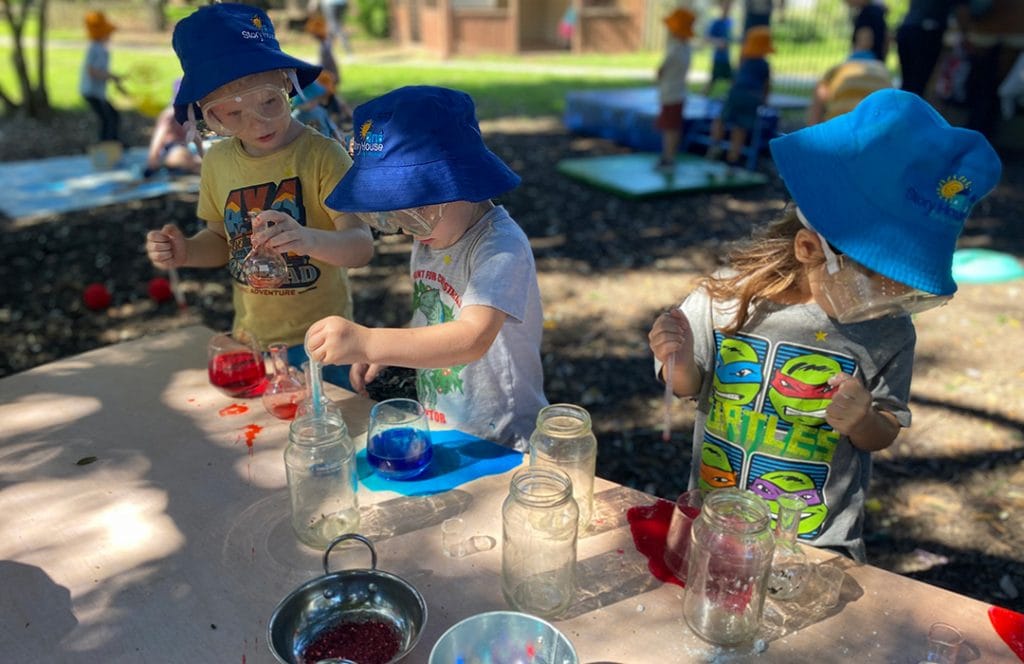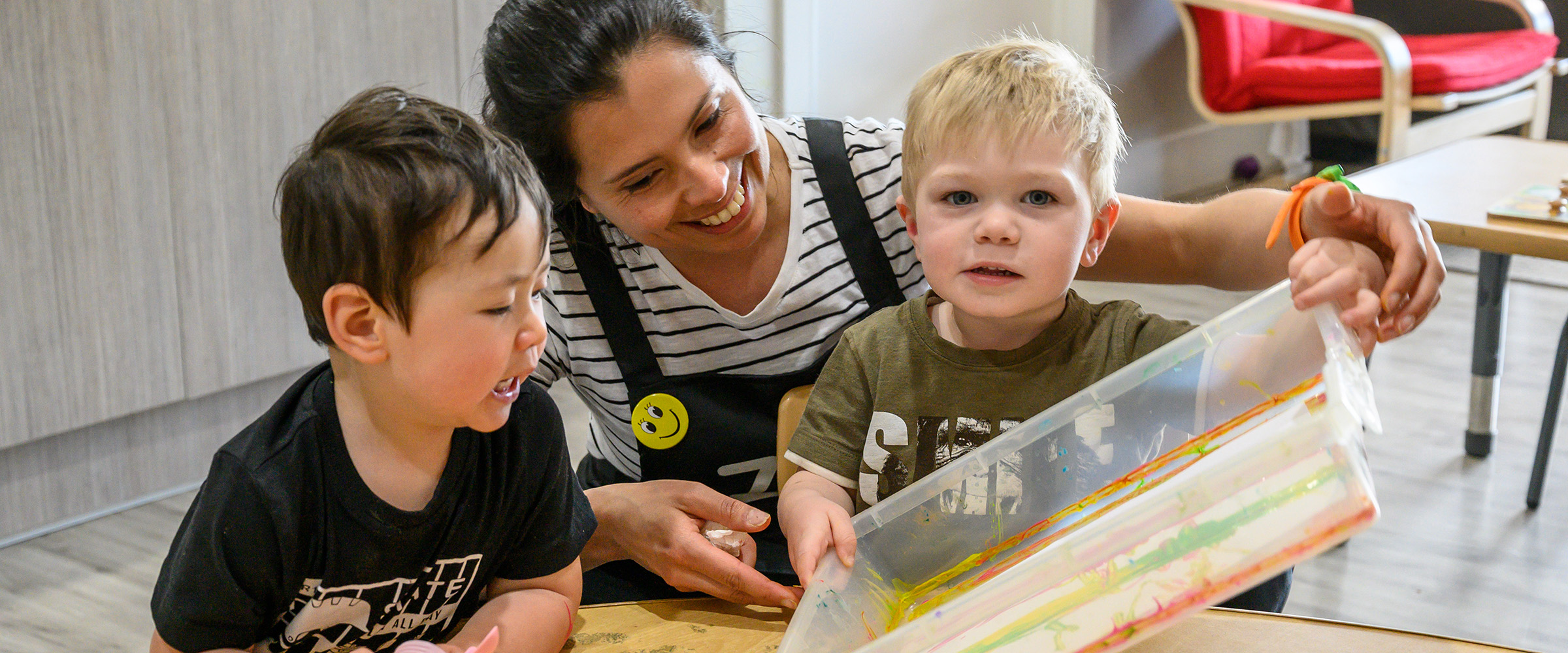Did you know that 90% of a child’s brain is developed before the age of five, and this development occurs through active play? Early childhood education research suggests that opportunities for free play are a significant factor related to child development, specifically brain and muscle development. Purposeful active play within the context of nurturing relationships and responsive interactions supports the development of the brain and enhances a child’s learning.
Why play is important in early childhood?
Play is thought to stimulate imagination and creativity, to encourage problem-solving, and to offer children opportunities to experiment with their understandings and test their theories of how the world works.
When a child plays with props or materials to symbolise something else, it allows children to be involved in and be the conductor of their brain development. For example, a block becomes a mobile phone, this can be linked with social development such as language and literacy skills, along with skills encouraging other cognitive development, such as representing ideas and transforming materials.
How does play support child development?
Early childhood research shows us that learning through play is one of the most effective ways for our children to learn. However, there are a number of different types of play that can develop different parts of our child’s brain.
Physical
Through physical play children are able to build up their small muscles. During a child's younger years, they might engage in an activity called tummy time, which is a similar principle. By allowing your child to climb or run around they are able to use those small muscles which encourages the strengthening of their body.
Social Skills
The importance of play, specifically with other children, in the social and emotional development of children is paramount. When children play together they are able to learn from one another and can hear other people's ideas. A child's success will be based on how they can interact with other people, whether it is asking for help or identifying emotions.
Mental Health
Children like to play. A child's learning can always be a beneficial and positive experience, it isn't primarily about learning. However, learning through play also encourages children's individuality and allows them to express their ideas in a safe and fun environment. This can build their self-esteem and allow them to learn the foundations of positive mental health.
Cognitive Development
A play-based approach to learning can encourage the brain development in a child's early years. By having them participate in certain activities, play helps them build resilience and concentration, recognise colours and shapes as well as encouraging skills such as creativity.
Literacy & Number Skills
The importance of play in early childhood development and preparing for their education is paramount to preparing for success. In symbolic play, you can teach your children things such as communication skills, learning letters or numbers, improving on their writing ability through drawing or experiencing how stories and games work.
Structured or Unstructured Play Experiences
All children learn differently but the importance of play cannot be understated. There are different types of play that you can implement with your child to promote the physical health, social skills and other forms of child development.
In your child’s early years, most children will participate in unstructured play. This is typically a time for their own play where they can be imaginative and explore their own ideas. They could also play with other children but it allows for them to make up their own mind about how they would like to play.
As children grow, and they begin to pay attention to the world around them, they might take part in more structured play. This could be more physical activities, like playing soccer in the backyard, playing with a specific group of small toys or other types of board games that they might play with other children.
Imaginative Play in Early Childhood Education
Imaginative play assists children to use objects and events in their free play to make sense of the world and understand the process of how things work. Play is also thought to be an excellent context for parents to promote vocabulary learning by extending children’s interests and offering opportunities to acquire new words related to their interests through everyday interactions. This type of child development emphasises the importance of play in social and emotional development as it allows them to develop communication skills, and the child learns more about their own individuality.
By using the process of trial and error in their play children learn to have better cognitive skills, such as the ability to reason and conceptualise actions. Through unstructured play, they can transfer learning into problem-solving tasks. Children who engage in imaginative play and free play are found to demonstrate better cognitive development and resilience as they are the organisers and directors of their play.

Tips for Effective Free Play Experiences:
- Use simple toys that encourage imagination and creativity, including household objects such as boxes, washing baskets, blankets, pots and pans, as well as playdough, blocks, sand, paper and crayons. Choose options that have different textures to encourage your child’s development and gross motor skills. Offer versatile and open-ended dress ups such as capes, scarves and aprons. Let your child know that there is no right or wrong way to play.
- Be available to children as they play. Encourage children in their unstructured play through being involved or questioning the reason why they are playing that character, building that cubby or drawing a particular picture. These challenging conversations will increase engagement and is more likely to develop their cognitive skills.
- Initiate conversation, model language use, and facilitate and expand on pretend talk. Describe the play by asking open-ended questions to elaborate on play themes and introduce relevant knowledge and concepts. For example, ask them to describe other people’s feelings, “I can see you are cuddling your teddy, do you think teddy is sad or is he feeling hungry?” This will allow your child to develop their social and emotional development through their play experiences.
Children learn through shared problem solving
Play activities encourage discussions on ways to problem solve with other children, siblings or parents to build knowledge and understanding. Problem solving opportunities can emerge from the issues, problems and questions in children’s everyday lives, such as reaching the top of a shelf to get a toy, making a tunnel in the sandpit, or helping set the table.
Tips for engaging in shared problem-solving:
- Create opportunities for shared endeavours. Even the briefest of moments of shared attention with young infants are valuable for your child’s development.
- Provide open-ended activities and authentic materials you can find in your child’s life, such as seeds and real gardening tools, or actual supermarket items for playing shop. This facilitates children’s thinking and language as they participate in the experience. Plan activities (also called structured play) which encourage challenging conversations, for example, “How many placemats do we need for our family to sit together for dinner?” Building on these simple early childhood education tasks such as simple games involving basic maths or literacy skills will better prepare your child for primary school.
- Make the problematic situation explicit. Asking children’s ideas, to give their account of the problem and offer their perspective. Hold off giving direct answers or evaluating responses as good or correct. Encourage children to share knowledge, ideas and hypotheses, challenge and evaluate each other’s ideas, and consider choices. For example, “I am wondering, if we keep filling the basket with blocks, will it overflow? Is the basket too small for all our blocks?” The child learns how to think for themselves through this type of important play.
- Support children in extending their abilities to meet problem-solving tasks. Unpack problems (whether these are task-focused or emotional problems) through question sequences, and model strategies such as observing and monitoring your own actions and thinking. For example, “What is stopping you from placing your arm in your jumper, is the sleeve of the jumper tangled? I wonder how we can untangle the sleeve.”
Children play because it’s good for them
The most important concept to remember is that a fun play-based approach is the avenue for children to work out their world and build their understanding by being actively involved and have ownership over their play event. By understanding the importance of play, and allowing your child to continue their learning through play, we can bolster their self-esteem as well as stimulate their brain development. Allowing children time to discover, think, predict and problem solve through play with an adult’s guidance is the best way to encourage child development.
The importance of play in your child’s early years can help set them up for success. The benefits of play are consistently being proven through research and there are many resources which can help you make the time positive and worthwhile, but also sometimes we need to let our children be children. Let them play.


